Wuthering Heights interview February-2004.
|
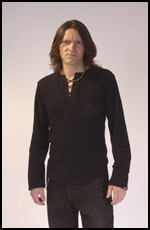 |
 |
Q: I see a certain interest for hard rock/heavy rock and all its sub-genres again after a few lame years. Do you think we have a healthy scene at the moment with all the Internet business - and also the negative part with illegal downloads and so?
A: Hard to say. Itīs definitely better than it has been. When we were really ready to show our stuff to the world back around 1995 or something, it was totally hopeless. Back then there was no interest whatsoever from recordlabels. That is better now for sure, because some labels have had big commercial successes, so they are interested in finding the next big thing. But then again, itīs not 1987 is it? A thing Iīve thought about is that back when heavy music was really big, one of the reasons was that the girls liked it too - Bon Jovi and all that. Then youīre suddently able to sell twice as many records and concert tickets. But when all the (male) musicians started to look like shit and play death or grunge or whatever a lot of the girls left the scene again. Now it seems to me that some of the darker subgenres - black and gothic and stuff, which is very visual - have an almost predominantly female audience. Hence, those guys sell a lot. I think there is a point there - I mean, why does Pretty Maids still draw quite a lot of people to their gigs? Because the girls want to hear the ballads, and then their familymen-boyfriends are allowed to attend a heavy concert also. Well, all that aside, I think the internet has been great for heavy metal, as for any underground movement. If the big media donīt want anything to do with it, we just do it ourselves on the internet. Also the progress in recording technology has made it easier and cheaper for people to make their own records without being backed by a big record company. So in some way the technology has liberated the art. The downside being of course that there are so many bands out there. But hopefully quality will prevail. And I donīt really consider downloading a big problem for real music. I guess most musiclovers will want to own the real thing. I believe it is a serious issue for the pop industry, but if all that MTV-driven crap is to disappear I donīt think it will be a great loss for the world.
Q: What words do you pop up with regarding Wuthering Heights? Where do you get your inspiration for the songs? How do you work - and how does the band work with the music and the lyrics?
A: Iīm reluctant to name us a part of any specific subgenre, because that would be to limit our future possibilities. And also because it doesnīt interest me that much. To me itīs "heavy metal" - thatīs what it was called when I started and Iīve never tried to do anything else. That however does not mean that you canīt be as creative as possible - indeed I think weīre obliged to. There are so many things you can do within the heavy metal framework, and I intend to try a lot of them. One of the things we have tried a lot is combining metal with folk music elements. But that doesnīt make it less heavy, it just adds a certain atmosphere which fits these particular songs. Maybe future songs will need other atmospheres - who knows? About songs - itīs all very songbased (rather than riffbased) - or rather lyricbased, really. I write the lyrics first, then build the music around that to express the content the best possible way. In other words the songs really dictate the sounds. I write from my own experiences, my own ideas and beliefs. I try to make it interesting by presenting things in an adventurous and poetic way, because I believe the lyrics should be beautiful in their own right. But anyway, itīs not the fantasy thing that many people think. Itīs really more of a traditional singer/songwriter or storyteller thing - singing about something thatīs on your mind, something you want to express - and not some meaningless story of knights and dragons just to have lyrics at all. Anyway, when the songs are written, I do a complete preproduction in my homestudio, playing all the stuff myself. Then the guys get a demo, and they throw in their ideas for their solos and stuff. Then we meet in the real studio and rock it out! Doing it this way, we can keep expensive studio time on a minimum, which is necessary when youīre doing such relatively complex music. And when weīre in the studio everybody knows what to do and we can concentrate on the actual performance. It gives a certain relaxed atmosphere to the recording which definitely worked very well this time - it was quite a fun record to make
Q: In my review I mentioned a certain comparison to Skyclad and as a supplement to the last question I would be very interested in where you get your Celtic Influences from - due to the fact that you are from Denmark?
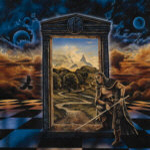 |
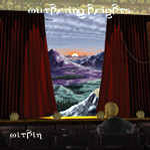 |
A: Iīve always been fascinated by everything celtic or mediaeval. I visited Scotland as a kid, which made a big impression on me. I went their again some ten years later, that was just as magnificent - I love that country. But also the celtic sounds touch me really deeply. Not long after I had started listening to metal, I started listening to folk music on a regular basis - we had a late night radioshow that I would listen to every week. I tried to play some of this stuff - or rather make up things that I thought sounded folk-ish. And it just felt natural for me to blend it with the metal stuff - I thought these fast fiddle riffs sounded really cool on the electric guitar. So it just went from there. A little later I saw Skyclad in concert and bought their first album. That encouraged me a lot. It showed me that I might be on the right track, that I wasnīt totally insane (?). Also I have to say that Iīve been a Thin Lizzy fan almost as far back as I can remember, and you canīt really play a folk-rock-combination without owing a lot to them, can you? Actually I considered Phil Lynott as some kind of guardian spirit for this album, it was sort of the "theoretical" goal to make a metal version of the "Black Rose" album...
Q: As a band like Saga you have a permanent topic on your albums. What is the story behind your character "The lonely Wanderer"?
A: Itīs mainly the story of my own life - the Wanderer being a sort of alter ego - but itīs not a complete concept deal. The songs can easily stand alone, but there are some reoccuring themes and characters. It deals with the journey through life, growing up, trying to understand oneīs place in the universe, searching for reasons to stay alive in this insane world. That is one layer of the story. On the larger scale it also deals with mankindīs journey through the ages and the increasing conflict between man and nature. The power of nature has a strong presence in the tale. The journey comes somewhat to an end on this album, but maybe not the end that the Wanderer - or indeed me - had expected. But I donīt want to spoil it all here, anyway itīs not all that specific so you can probably make your own conclusions - or just enjoy the songs as they are.
Q: Will you take the music to the streets someday? Your material in mind it would be a big big production I presume?
A: Not that big, necessarily. We have played live before, and itīs really just a matter of getting up there and play the songs. Iīm not the kind who thinks a liveshow should sound like a recording, using prerecorded tracks and all that - then you might as well stay at home. Weīre definitely rougher on stage, because we canīt do all the layers of the recordings live of course. If your songs are strong enough you should be able to play them in a different instrumentation. Our sound is symphonic yes, but that is not the backbone of the music - the songs are. Anyway, the biggest problem with livework is getting together to rehearse, and also the sheer costs of taking the band on the road. I donīt think a tour as such may lie in the near future, but hopefully we can do some festivals or something. It would definitely be cool to rock with the fans face to face.
Q: Thanks for your time. Your newest record I think is one of the cornerstones in melodic progressive rock hailing from Denmark - Good luck in the future, whatever it may bring!
Steen Peitersen
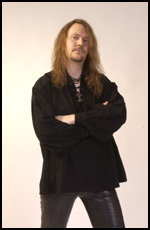 I have always had great difficulties placing this Danish/Swedish five-piece on a musical map. In their grand epic compositions there are elements from almost every genre - folk, power metal, classical, progressive and orchestral hard rock. Like taking a mix of Gary Moore, Blackmore's Night, Ronnie James Dio, Vanden Plas, King Diamond and Skyclad! (get the picture?)
I have always had great difficulties placing this Danish/Swedish five-piece on a musical map. In their grand epic compositions there are elements from almost every genre - folk, power metal, classical, progressive and orchestral hard rock. Like taking a mix of Gary Moore, Blackmore's Night, Ronnie James Dio, Vanden Plas, King Diamond and Skyclad! (get the picture?)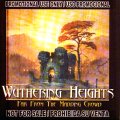 A: Itīs not that anything particular happened. You see, the main part of the material for all our three albums was already written when we started recording our debut. So from the beginning the idea was that there should be this kind of development or natural progression rather than any sudden change of style. I knew very early on what I wanted to do. I wanted to try and blend the metal and the folk music styles that I love so much - and adding that certain touch of symphonic drama. But this is not something you achieve overnight. So since the beginning Iīve really just been trying to get closer to that goal. You can say that all those songs were grouped together depending on their degree of "completion". But I certainly agree that the new album sounds more focused. But again this is kind of deliberate. You know, to reach a suitable level of anything you sometimes need to take things to extremes. That was somehow what we did on the last album. Now weīve been out there and we can now come back to a more balanced sound. You need to push the borders sometimes, but having done that you donīt need to stay on the border all the time.
A: Itīs not that anything particular happened. You see, the main part of the material for all our three albums was already written when we started recording our debut. So from the beginning the idea was that there should be this kind of development or natural progression rather than any sudden change of style. I knew very early on what I wanted to do. I wanted to try and blend the metal and the folk music styles that I love so much - and adding that certain touch of symphonic drama. But this is not something you achieve overnight. So since the beginning Iīve really just been trying to get closer to that goal. You can say that all those songs were grouped together depending on their degree of "completion". But I certainly agree that the new album sounds more focused. But again this is kind of deliberate. You know, to reach a suitable level of anything you sometimes need to take things to extremes. That was somehow what we did on the last album. Now weīve been out there and we can now come back to a more balanced sound. You need to push the borders sometimes, but having done that you donīt need to stay on the border all the time.
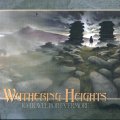 A: Ehhmm...the bassist is me, so I know him quite well...?! The guy who should have played the bass on this album backed out two weeks before we were to start recording. So in a feverish frenzy I had to learn and record all those insane basslines in a matter of days. It was tough, but actually I think it worked out quite well. At least I got the type of bass that I like, real dirty and mean. The change of vocalist is always significant of course. I think our getting together with Patrik has really lifted the band to another level, just like it lifted the band when drummer Morten Sørensen joined us for the last album. Line-up changes are always talked about in a negative way, but I donīt think it necessarily has to be negative. In our case we have some who have been with the band for years and know the story and spirit of the band, but it can also add new energy when you get someone new. Usually "new guys" come with a lot of energy and determination to show what they can do. Patrik was definitely very serious and commited. And I mean, as long as you change for something better, it must be good, right?
A: Ehhmm...the bassist is me, so I know him quite well...?! The guy who should have played the bass on this album backed out two weeks before we were to start recording. So in a feverish frenzy I had to learn and record all those insane basslines in a matter of days. It was tough, but actually I think it worked out quite well. At least I got the type of bass that I like, real dirty and mean. The change of vocalist is always significant of course. I think our getting together with Patrik has really lifted the band to another level, just like it lifted the band when drummer Morten Sørensen joined us for the last album. Line-up changes are always talked about in a negative way, but I donīt think it necessarily has to be negative. In our case we have some who have been with the band for years and know the story and spirit of the band, but it can also add new energy when you get someone new. Usually "new guys" come with a lot of energy and determination to show what they can do. Patrik was definitely very serious and commited. And I mean, as long as you change for something better, it must be good, right?